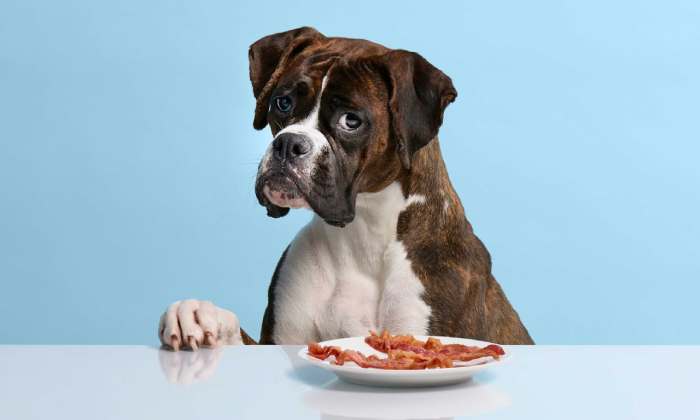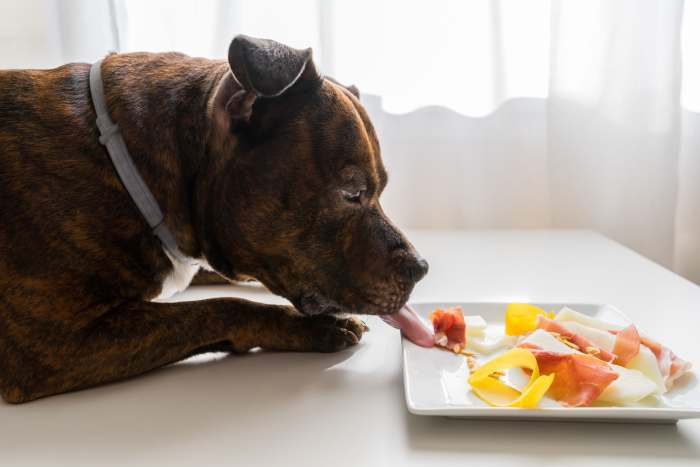As a dog lover of the digital age, you’ve probably heard various opinions on whether bacon grease is good for dogs. Sharing your breakfast leftovers with your furry friend is tempting, but is it safe?
This guide will help you understand the nutritional profile of bacon grease, its potential health risks for dogs, and safer alternatives. You’ll also gain insight from expert opinions on the subject.
Remember, it’s not about depriving your pup of tasty treats but ensuring they’re healthy and happy for years. So, let’s discover if bacon grease should be on your dog’s menu.
Tailoring Nutrition to Meet Dogs’ Unique Requirements:
Regarding your dog’s dietary needs, it’s important to understand that their nutritional requirements differ significantly from human ones. Dogs’ metabolism is designed to process proteins and fats efficiently, while humans can metabolize a wider range of foods. This difference makes certain human foods potentially harmful to dogs.

For example, bacon grease, high in fat and salt, can lead to obesity and pancreatitis in dogs. Additionally, some dogs may have allergic reactions to ingredients found in bacon, such as preservatives or flavorings. Feeding your dog bacon grease could, therefore, pose serious health risks.
Always consult a vet before introducing new foods into your dog’s diet to ensure they’re safe and nutritionally appropriate.
The Nutritional Profile of Bacon Grease:
You might be surprised to learn how unhealthy bacon grease can be for your furry friend. The grease composition of bacon is primarily saturated fat, which is notorious for causing health issues such as obesity, pancreatitis, and heart disease in dogs.
The cooking impact also dramatically alters the nutritional profile of the grease. Heat processing forms harmful carcinogens and degrades any minor beneficial nutrients present.
Consider the following:
- Bacon grease is a high-calorie food with little nutritional value for your dog.
- It’s high in sodium, which can lead to salt poisoning in dogs if consumed excessively.
- The high-fat content can upset your dog’s stomach, leading to vomiting or diarrhea.
Potential Health Risks for Dogs with Bacon Grease Consumption:
Despite the delicious taste, feeding your dog bacon grease can lead to serious health problems. The high-fat content can result in grease toxicity, causing pancreatitis, a painful pancreas inflammation. Symptoms include vomiting, diarrhea, and lethargy. If left untreated, it can be fatal.
The high salt content in bacon grease can also lead to salt poisoning, which can cause seizures and even death. Furthermore, dogs can have allergic reactions to bacon grease. Symptoms can include itching, redness, and swelling.

It’s also worth noting that the nitrates used in bacon production can cause oxidative stress, leading to various health issues. Therefore, it’s crucial to avoid feeding your dog bacon grease.
Safe Alternatives to Bacon Grease:
Looking for healthier alternatives to bacon grease for your furry friend is crucial to ensure their well-being. Vegetable broths and fish oils are excellent substitutes that provide essential nutrients without the high-fat content.
Consider these alternatives:
- Vegetable Broths: Rich in vitamins and minerals, they’re a low-calorie option that enhances the flavor of your pet’s food.
- Fish Oils: Containing Omega-3 fatty acids, these benefit your dog’s skin, coat, and overall health.
- Lean Meats: Cooked chicken or turkey, without skin or added fat, are protein-rich substitutes.
Expert Opinions on Dogs and Bacon Grease:
While these healthy substitutes can contribute to your dog’s diet, many veterinarians and animal nutritionists caution against bacon grease. From a vet’s perspective, bacon grease can lead to pancreatitis, a painful and potentially deadly condition.
This is due to grease toxicity, as bacon grease is high in fat and can cause an inflammatory response in your dog’s pancreas. Additionally, it may lead to obesity, another serious health concern. Studies show that dogs fed with a high-fat diet have a higher risk of developing heart disease.
Thus, it’s important to consider these expert opinions before deciding to supplement your dog’s diet with bacon grease. Remember, your dog’s health should always be your top priority.
Frequently Asked Questions:
Bacon grease can alter your dog’s diet preferences, making them favor fatty, salty foods. However, it’s not healthy and can lead to grease allergies. Consider bacon alternatives for a healthier, balanced diet.
While bacon grease can potentially moisturize dry skin, it’s not recommended for dogs. They may develop grease allergies or have difficulty digestion, leading to upset stomachs, pancreatitis, or other serious health issues.
Whether raw or cooked, the digestibility of bacon grease remains challenging for dogs. It can cause allergic reactions and other health issues. Always consult a vet before introducing such items into your pet’s diet.
No specific breed shows higher grease tolerance. Regardless of breed susceptibility, it’s unwise to feed dogs bacon grease. It can lead to pancreatitis, obesity, and other health issues. It’s best to avoid it altogether.
Bacon grease’s high-fat content can disrupt your dog’s normal digestion process. While it may initially give an energy boost, it’s likely to cause lethargy and potential health issues over time. It’s best avoided.
Conclusion:
You’re playing Russian roulette with Rover’s health if you feed him bacon grease. Yes, it’s a tantalizing treat, but the potential hazards far outweigh the fleeting joy.
Its high fat and sodium content can trigger serious ailments, from pancreatitis to obesity. It is better to stick with safer alternatives and vet-approved treats that satisfy Fido’s cravings without compromising his health.
Remember, you hold the key to your furry friend’s well-being.